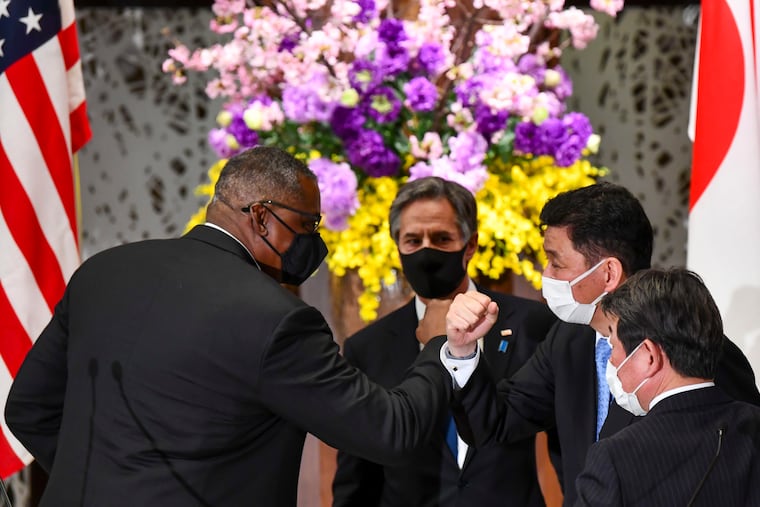Unlike Trump, Biden knows Asian allies are key to dealing firmly with China | Trudy Rubin
President Trump dissed allies as "freeloaders," but President Biden seeks a united front to discourage Chinese aggression in Asia.

During his presidency, Donald Trump repeatedly insulted America’s Asian allies, calling them “freeloaders.” He threatened to bring U.S. troops home from South Korea and Japan.
Despite sizeable monetary contributions from both countries for U.S. basing costs, Trump viewed the Asian allies in terms of how much they contributed to U.S. coffers — as if U.S. troops based in Asia were third-world mercenaries for hire. He ignored the allies’ role as U.S. partners with democratic values who can work to curb the Chinese regime’s expansionist impulses.
That blinkered outlook has already been reversed by the Biden team, and not a moment too soon.
» READ MORE: An admiral and a novelist want you to imagine a nuclear war with China | Trudy Rubin
Just before setting off for Japan and South Korea this week for security consultations, Secretary of State Antony Blinken and Secretary of Defense Lloyd Austin wrote, in a Washington Post op-ed: “Our alliances are what our military calls ‘force multipliers.’ We’re able to achieve far more with them than we could without them.”
That doesn’t refer only to military cooperation. Last week, Joe Biden held a Quad Summit, a virtual meeting of the leaders of Japan, India, and Australia, at which the four pledged to partner to expand global manufacturing capacity of vaccines against the coronavirus. They seek to expand Indian capacity to make and export vaccines to developing countries.
This will be a first U.S. step toward catching up with China and Russia, who have been exporting their vaccines as an instrument of soft power.
“The U.S. is using alliances to combine resources to confront 21st-century challenges,” says Ryan Hass, author of Stronger: Adapting America’s China Strategy in an Age of Competitive Interdependence. “With the Quad, they are showing they have solutions for the region.”
As the U.S. competes with China for soft power influence, Hass says “the Quad gets more traction by offering solutions.”
The Chinese regime is wooing developing countries in the region with big infrastructure loans that create huge debt burdens, which Beijing can later manipulate to obtain military port access or political support. To counterbalance, Washington and its democratic partners need to offer regional solutions on development issues, including climate change.
But a focus on soft power issues does not mean, as GOP critics proclaim, that Biden is “soft on China.”
The Biden team’s invigoration of Asian alliances is also meant to caution Chinese leaders against more military adventurism in the region.
China’s neighbors don’t want open confrontation with Beijing. (As Hass rightly warns, “if the United States tries to form an openly anti-communist bloc like NATO in Asia, it would find little purchase.”) But Chinese leader Xi Jinping’s aggressiveness has made Asian allies more responsive to strengthening alliance ties with Washington to warn Beijing off potential military conflicts neither side wants.
Chinese troops have fought with Indian soldiers along their disputed border. Beijing has sought to punish Australia economically for seeking an international investigation into the origins of the COVID-19 outbreak. And China still confronts Japan over disputed islands.
Most dangerous are China’s challenge to freedom of navigation in the South China Sea, where it is building contested atolls into military bases — and its threat to unite democratic Taiwan to the mainland by force.
While still working out how to balance its overall China policy, the Biden team clearly grasps the era we live in. Although the president and much of his national security team served in the Obama administration, they have made clear their far tougher approach to Beijing now.
Trump talked tough and pointed out the threat, but his approach was a failure. He had no overall strategy — beyond America First, unsuccessful trade sanctions, and cozying up to Xi at Mar-a-Lago.
The Biden team recognizes that bluster won’t cut it with Beijing. And that is why renewing America’s Asian alliances is key.
So unlike Trump, who threatened to withdraw U.S. troops from South Korea unless Seoul coughed up five times its annual $1 billion payment to Washington, the White House has already renewed its basing contract with the South Koreans for a reasonable increase. The U.S. alliance with Seoul is crucial in pressing North Korea (and its Chinese patron) on reducing its nukes.
And unlike the last president, who contemplated pulling back U.S. troops from Japan and also insulted its leadership, Biden has issued his first White House invitation to Prime Minister Yoshihide Suga, signaling to Beijing the U.S.-Japan relationship is rock strong.
» READ MORE: Why Americans should care about the trial of Martin Lee in Hong Kong | Trudy Rubin
“Alliances are crucially important,” warns Elizabeth C. Economy, author of The Third Revolution: Xi Jinping and the New Chinese State. “If you look ahead at China 2035, China’s economy will have surpassed ours, its military is growing, and its population is four times ours. For the U.S. to ensure the rules-based international order continues to exist, it requires working with allies. We can’t do it alone.”
So out with America First and in with the Age of Alliances, in order to keep America secure in the future. That is what this White House understands.